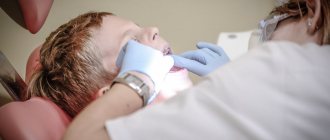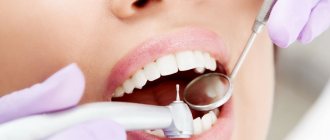One of the fundamental principles of modern dentistry is pain-free dental treatment. However, most adult patients feel nervous while sitting in the dentist's chair, and some are completely unable to overcome the horror that grips them in the dentist's office. When it comes to the treatment of baby teeth, the problem becomes especially acute. The need to visit the dentist can cause real hysterics in a child. If you don’t help your child cope with his fears, in adulthood he will constantly put off visits to the dentist. How to overcome childhood dental phobia?
What is this condition and when does it occur?
Dentophobia is the fear of dental treatment.
In such a case, the patient comes to the dentist only in acute situations when the tooth hurts badly. Most often, a child is afraid of the dentist if he has a negative experience with him or the child is simply afraid of doctors and reacts negatively to a white coat. This kind of fear occurs in many children, and it often lasts a lifetime. An adult visits the dentist only when there is severe pain. This condition occurs in a child for the following reasons:
- the child meets the dentist for the first time when he already has severe toothache;
- character traits in which the baby is shy and indecisive, afraid of any unfamiliar situation;
- he was forcibly held down during dental treatment; if adults rudely invaded his personal space, this causes a protest;
- parents do not explain to the child why they need to go to the dentist and have their teeth treated;
- all children react poorly to examination of the oral cavity by a doctor immediately, without prior preparation, this is unexpected for them;
- negativism arises when the baby was once deceived by adults, he was told that it would not hurt, but the procedure was painful.
Fear of doctors in a white coat occurs if the child has been seriously ill in the past. He transfers this experience to all doctors, and can never cease to be afraid of doctors of any specialty.
About feelings
It is quite normal that when bringing a child to the dentist, a parent feels nervous and worries about how everything will go.
And if a child is in pain, then he suffers along with him. Perhaps he feels guilty and wants to quickly change the situation and alleviate the baby’s suffering. If you are familiar with such feelings, then listen to our advice:
- It is a mistake to exaggerate the seriousness of the situation and escalate the situation. This way you can scare the child in advance and he will be tense even before the appointment.
- But you shouldn’t underestimate the situation either, otherwise the child will not realize the importance and necessity of treatment.
- Do everything possible to prevent your anxiety from being passed on to your child; act naturally and at ease. This will also allow the child to be calm and free.
It is easier for the doctor to find contact with a calm child.
And if the child is free, he will quickly talk about his fears or other experiences. After all, it is precisely these experiences that can interfere with treatment. And then the doctor, knowing this, will choose the appropriate work tactics.
Rules for examining and treating children at the dentist
In order for your child to stop being afraid of dental treatment, it is necessary to follow certain rules and act gradually.
Experienced dentists recommend:
- Parents should bring their daughter or son for preventive examinations. It is better to take them to the same specialist.
- The dentist should not immediately start with treatment; he needs to get to know the child.
- During the first examination, the doctor is not recommended to even wear gloves or pick up dental instruments, so as not to frighten the baby. You can give him a tour of the clinic and give him something.
- The doctor must establish contact with him and tell the baby what happened to his tooth.
- The dentist must explain to him in clear language what he is going to do now. The doctor must be able to persuade children.
- It is necessary to carry out only those manipulations that he agreed on with the baby.
- In good dental clinics they play cartoons or a children's film. The kid, captivated by the plot, is distracted from the procedure. At this time, the dentist does everything necessary to treat his teeth.
- If the baby asks his mother or grandmother to stay with him, he must be allowed to be present in the office. It will be easier to calm him down.
- A good help in developing a positive attitude towards dentists is the personal example of parents. The baby can be taken with you when adults go to the dentist. He realizes that this is a common thing and everyone takes care of their teeth.
- Sometimes it is possible to resort to treating the child under anesthesia. Before this, you need to make sure that the clinic can do it efficiently and there are opportunities to provide emergency assistance if something goes wrong. You must understand that children have age restrictions and this cannot always be done.
If the child understands that the doctor can be trusted, and the dentist does only what he promised, he will be less afraid and will begin to trust him. Next time the treatment will be smoother. The baby will develop a positive attitude towards dental procedures.
Why is a child afraid to have his teeth treated?
When you meet with a dentist, the work of the central nervous system (CNS) changes: a chain reaction starts - the brain converts sound and image into an alarm signal. And then the signal is fixed in memory. When the situation repeats, the body begins to react accordingly even to the kindest dentist - the heartbeat quickens, sweating increases.
It is noteworthy that all children are afraid of pain. However, from the age of three, children develop fear of the sight of blood. Another reason why a child is afraid to have dental treatment is the fear of unfamiliar people and surroundings.
How to form a positive attitude towards treatment in a child
In order not to provoke a negative attitude towards dental procedures and the child begins to have a positive attitude towards treatment, you can take the advice of psychologists.
They give the following advice:
- visit the dentist regularly for preventive examinations, and not just when a tooth hurts, this makes it easier to form a positive attitude in your child towards dental treatment;
- plan a visit to the dentist in the morning, he will be calmer and more relaxed during the appointment, he will have less opportunity to think about the upcoming treatment and worry;
- during the trip, the doctor does not need to discuss upcoming manipulations with the baby; it is better to talk with him about abstract topics;
- carefully choose your attending physician; he should have extensive experience in treating young patients;
- do not show your excitement to the child, he will feel it and also become worried;
- after treatment, you need to praise the baby, say that his teeth will be healthy and strong;
- if there is a need to discuss the procedure, this must be done and the child will speak out;
- play dentist with your baby, treat your teeth with toys;
- watch a cartoon about Aibolit with him and discuss how important it is to treat your teeth on time;
- Do not discuss the treatment of your teeth in front of your child; he must not hear from his parents how painful it is to fill them, pull them out and drill them;
- Do not frighten children with bad behavior with visits to the dentist;
- In case of whims and bad behavior at a doctor’s appointment, there is no need to scold or punish the baby.
These tips will help you overcome your fear of dental procedures.
The main mistakes of parents or how to double children's fear
The first visit to the dentist, even for the most determined little one, is a step into the unknown. Boys and girls do not know what awaits them and how to behave.
However, very often the fear of dentists in children intensifies after the first visit to the doctor. And most often, the main cause of fear is not the drill at all, but the behavior of the parents. Let's look at the main mistakes that moms and dads make when going to the dentist with their baby.
- A child visits a dentist for a toothache
. Modern children are no less busy than adults: various clubs and sections, entertainment and travel. Often, parents do not find time to conduct a preventive examination, naively believing that pulpitis does not occur on baby teeth and caries on them does not need to be treated. As a result, the child goes to the doctor with acute pain and, of course, exhausted, is several times more afraid to have his teeth treated. - Parents motivate their children incorrectly
. Instead of explaining to the child that dental treatment is necessary for his health and there is no need to be afraid of treatment, mothers and fathers begin to encourage trips to the doctor with exclusively a variety of expensive gifts. Or, even worse, inventing fairy tales about the evil snake Gorynych, who will fly in and steal all the teeth. As a result, the child does not understand the importance of dental treatment and turns it either into a way of manipulating parents or into an unreasonable fear. - Parents forcefully treat their child's teeth.
Instead of explaining that you need to sit quietly and endure a small injection, parents sit the baby in the doctor’s chair and hold him in it by force. Such physical impact, especially from the closest people, inspires real horror in the baby. - Moms and dads choose uncomfortable times to visit the doctor.
A trip to the dentist will become several times more painful for a child if you take him to the doctor instead of a nap, after training in the pool, or at night. Naturally, the child is twice as afraid to have his teeth treated, because he is weak and capricious. - Parents tell their children about their bad experiences.
Modern dentistry has made the process of dental treatment almost painless. - Parents deceive their child
. There is no need to tell the baby lies: mothers and fathers should prepare him for the visit, and not tell tales about how “a mosquito will bite and it won’t hurt at all.” Be honest, yes, the anesthesia will be painful, but then the treatment will take place without any discomfort.
What to do so that your child is not afraid of the doctor: advice from psychologists
Psychologists have developed several effective techniques that parents can use to help their child stop being afraid of dental treatment. Let's consider each method separately.
1. Playing doctor
Show a little imagination and ingenuity: come up with a fun game for your baby. Look around the nursery: choose your baby’s favorite cubs, hares, hedgehogs and other animals. Come up with a game scenario - for example, the bear cub had a toothache, and he went to the hedgehog doctor to treat them. The doctor was very polite, gave the patient an injection, healed a hole in the tooth and even gave the little bear toothpaste and a book on oral care.
A role-playing game in which the mother will be a dentist and the child will be a patient will work well. And then vice versa. By trying on different roles and participating in different games, the baby will subconsciously be less afraid of the doctor.
2. Reward for good behavior
No, the “I’ll buy you a Barbie doll if you don’t scream at the dentist” method won’t work. First, it is important to explain to your child that going to the dentist is necessary to maintain dental health. The child must clearly understand the purpose of the visit.
But to make the baby less afraid, after visiting the doctor, you can ask the doctor to give him a small gift. The child will be very pleased to receive a gift from the dentist himself.
A pleasant and, importantly, useful gift for a child after visiting the dentist will be ASEPTA KIDS toothpaste, intended for children 4-8 years old. This fluoride-free gel paste provides gentle protection of teeth from caries and gums from inflammation. And the bright taste of “tutti-frutti” will turn the procedure of brushing your teeth into a pleasant sweet adventure.
3. Own example
By personal example, a parent can show their child that visiting the dentist is not a painful torture at all. Try going to the doctor with your baby. Let your child watch the dentist examine and treat your teeth. However, remember: your attitude at the doctor should be cheerful and positive.
And, by the way, so that the child is not afraid to have his teeth treated, you should never scold dentists in his presence. Maintain a bright image of a doctor, no matter what specialist you turn to in the future.
Let's give an example. One mother took a long time to treat her teeth. But every time she went to the doctor, she happily told her daughter about it. And after the visit to the doctor, she boasted to the baby that now there was no hole in the tooth and it would not hurt. And what do you think? Six months later, my daughter herself asked to see the dentist for an examination!
4. Gradual adaptation
There are no two identical children in this world. There is no need to worry if the child refuses to make contact with the doctor at the first meeting and is terrified of dental treatment. And even more so, you should not persuade your child with phrases like “good guys don’t behave like that.” Most likely, with such phrases you will achieve loud hysteria.
Try to adapt your child to the new environment. Look at the dentist's office together, take a walk around it, let the sunbeams shine through your mirror. Then explain what each tool is used for. A few minutes of acquaintance are enough, and you can go home. It is very likely that the next time the dentist will not look so intimidating for the baby.
5. Favorite cartoons
The dentist’s manipulations will be less noticeable to the baby if the treatment is accompanied by favorite cartoons. Ask your doctor to turn on the recording or allow you to stream cartoons from your tablet.
6. Heroes
Every kid has a favorite character - a movie or cartoon hero. So that a child is not afraid to have his teeth treated, his idol can be used as an example. Agree, it’s hard to believe that Batman or Superman are scared by the sight of a drill. Come up with a story about how the characters in childhood were also afraid to go to the doctor, but overcame their fear and went to get their teeth treated.
How to behave in an emergency
If your child suddenly gets a toothache, act quickly. In this case you can:
- Tell your child a story about a bad tooth that the doctor will cure and it will no longer bother you.
- Without having a serious conversation with your child. Explain how important it is to treat teeth on time and how modern medicine can help quickly relieve discomfort.
You shouldn’t lie to your child that treating pulpitis won’t hurt. It’s better to honestly tell everything about the upcoming procedure and be sure to emphasize that after anesthesia, the pain will immediately subside and the teeth will become healthy.
How to behave in a doctor's office
We hope that our recommendations for combating dental phobia in children will be useful, and the child will calmly withstand all dental tests. In conclusion, I would like to add some useful tips for parents on how to behave with their child in the doctor’s office:
- Don't shame your child.
Every person is afraid of something, regardless of gender and age. It is not the child’s fault that he got such a phobia. - Visit your dentist regularly.
Even if you yourself constantly examine your baby’s teeth, do not be lazy to take him to the doctor every six months. Believe me, from an early age a child should understand the importance of dental health. - Do not use physical force.
If a child throws a tantrum in the dentist's chair and runs away from the office, under no circumstances should you twist his arms and force him to sit back under the lamp. Leave immediately. Do the treatment next time. - Choose your dentist carefully
. Remember, the first doctor will form an impression on the child for life. If the child does not make contact with the doctor, try to look for another specialist - ask acquaintances, friends, ask in the kindergarten, maybe the teachers know a good dentist. - Distract your child.
There is no need to prepare your little one to go to the dentist a month before the appointment. Tell your child that you are going to the doctor 1-2 days before the visit. The longer the child “mentally prepares” to visit the doctor, the greater the likelihood that he will “cheat” himself and be afraid to have his teeth treated. - If necessary, sit next to the baby
. If you are sure that your presence in the office next to your child will help him overcome his fear, feel free to insist on this. Most dentists are okay with parents holding their child's hand. - Do not be afraid.
Remember, the child feels everything. If the thought of the dentist makes your knees shake, it's best to leave your baby's dental care to another parent or grandparent. - Don't try to treat all your teeth at once
. Remember, it is difficult for a child to sit still even for half an hour. If it so happens that several teeth are affected by caries, it is better to fill them gradually. - Make an appointment at a time that is convenient and convenient for your child
. It is best to go to the dentist in the morning or in the morning. The later the visit is, the more the child will “wind up” himself and will be afraid to have his teeth treated. - Let your child talk
. Once treatment is over, give your child time to vent, cry, laugh, and talk about treatment.
And one last piece of advice: praise your child.
Be sure to tell your child good, kind, encouraging words. Praise your baby for every courageous act, brag about his courage to his grandparents. Believe me, children appreciate it.
What to do if a teenager is afraid to go to the dentist
A teenager trusts adults less, it is impossible to distract him and it is difficult to convince him of anything. You need to establish a trusting relationship with him and show respect for his choice.
It is advisable to follow these tips:
- Be sure to condemn all the procedures that have to be done so that he is not frightened by the unknown. Most fears go away after a detailed discussion of the upcoming situation.
- If a guy or girl refuses treatment and the situation is not urgent, do not insist on visiting a specialist. Familiarize them with the consequences of their refusal in detail and allow them to make a choice. After discussion, the teenager shows interest in treatment himself.
- Create positive motivation in your teenager for dental treatment and careful oral care. Explain to him the importance of healthy teeth and a beautiful smile for his future.
- Until the age of fifteen, you can always be in the dentist's office with your son or daughter and support him. If they are older, then the presence of parents is possible only with their consent.
- Choose a doctor who can establish good contact with the teenager. He must take into account the teenager’s opinion and communicate with him as an adult, and not just listen to the parents’ opinions and fulfill their wishes.
If you cannot cope with the situation on your own and the child continues to be afraid of the dentist, you should contact a psychologist. He will provide him with professional help and help him cope with fear.
Treatment at the Shifa Clinic
At the SHiFA dental center, the office for receiving children is properly equipped. Treatment of children under three years of age is carried out under anesthesia, and for older children - with the use of sedation. Our center employs qualified psychologists who, in a playful way, show children that they should not be afraid of doctors. They help each child prepare for upcoming treatment.
Specialists with extensive professional experience turn treatment into an exciting event in which there is no place for fears and tears. The warm parting of the little patients with the doctors indicates that the trusting atmosphere dispelled all fears in their souls. As a result, a positive experience of visiting dentists will be formed in the future.
Atmosphere always decides
The interior of a children's clinic should look like a fairy-tale world, not an operating theater. Then there are real chances to make visiting a doctor an exciting adventure. It all starts in the waiting room. If there are a lot of toys and books, the child will be able to relax more. Sometimes doctors' offices have screens that show cartoons during treatment.
Total relaxation
If the child remains persistent and is over 3 years old, sedation can be used to relax and relieve anxiety. Typically, nitrous oxide is used (gas delivered through a nasal mask). Although it slightly reduces pain sensitivity, it still requires anesthesia. Most of the nitrous oxide is eliminated from the body 5 minutes after the end of the gas supply, and completely after half an hour. All the time while the sedation is working, the child breathes on his own, can move, is conscious, hears everything, understands, can talk, but reacts less acutely to stress factors. An important bonus: sedation reduces the gag reflex. The main requirement for sedation is normal nasal breathing. And it is worth considering that with very strong fear, sedation does not always produce the desired effect.
Publisher: Expert magazine about dentistry Startsmile.ru
Author of the material: Julia Klouda
If your tooth hurts
If the baby’s tooth is already sick, then you need to try in every possible way to positively influence him to go to the doctor. Remind yourself of the fairy tale about the evil Caries and the good wizard. Explain to your child that the doctor’s goal is not to offend, but, on the contrary, to help cope with the problem.
Tell him that treating a tooth is not scary. The dentist will select an individual cooling system for the dental tissue, as well as the drilling speed. If necessary, the doctor will numb the pain.
Get your child interested. Tell him that he can choose the filling he likes. You will also be able to get acquainted with the tools that the doctor will use during the procedure.
After treatment, you can give your child some kind of toy for his courage. It would be even better if the doctor did it, saying at the same time that the tooth fairy conveyed it.
Reviews
Dentophobia is a common phenomenon, however, and it can be dealt with. There are many recommendations given above, following which you can help your child overcome his fear and teach him to take care of his teeth and oral cavity every day.
If you have any other tips to offer, please don't hesitate. Write them below in the comments to this article.
If you find an error, please select a piece of text and press Ctrl+Enter.
Tags toothache treatment
Did you like the article? stay tuned
Previous article
Teeth whitening Yotuel - a modern development according to European standards
Next article
What is a rubber dam and why is it needed in dentistry?











